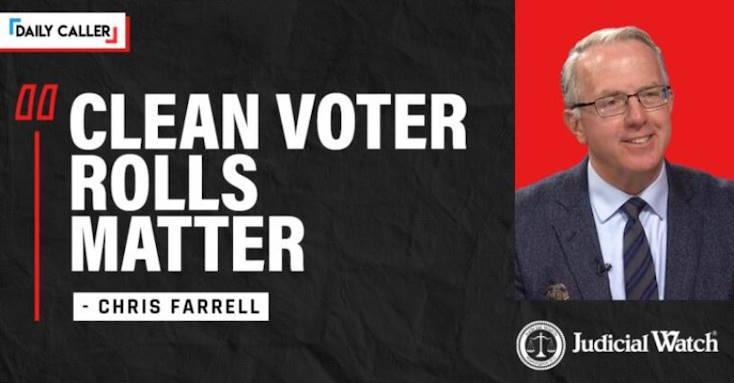
CHRIS FARRELL: Clean Voter Rolls Matter
By Chris Farrell
Dirty voter rolls make for dirty elections. Sloppy registration and accountability procedures and/or willful blindness to loaded-up voter rolls are key ingredients for mischief, manipulation, and other voting “irregularities.”
Bloated, inaccurate voter registrations can create the conditions that undermine public confidence in the already badly damaged reputations of officials and agencies administering our elections. The federal voting law, the National Voter Registration Act of 1993 (NVRA), acknowledges that–and that’s why Section 8 of that law requires the states to make “a reasonable effort to remove the names of ineligible voters from the official lists of eligible voters.”
Mostly, these ineligible voting registrations are for people that have died or changed residence. The law requires registrations to be cancelled when voters fail to respond to address confirmation notices and then fail to vote in the next two general federal elections. In 2018, the Supreme Court upheld such removals.
Judicial Watch has been successful in the removal of up to four million ineligible voters from voter rolls in New York, California, Pennsylvania, Colorado, North Carolina, Kentucky, Ohio, DC, and elsewhere.
In February 2023, Los Angeles County (alone) confirmed removal of 1,207,613 ineligible voters from its rolls since the year before, under the terms of a settlement agreement in a federal lawsuit Judicial Watch filed in 2017.
Judicial Watch now continues to press California counties to obey the law and clean up its voter rolls by filing a lawsuit (Judicial Watch Inc. and the Libertarian Party of CA v. Shirley Weber et al. (No. 2:24-cv-3750).
In correspondence with Judicial Watch, the State of California: “admit[ted] that 21 California counties removed five or fewer registrations pursuant to [the NVRA] … for failing to respond to a Confirmation Notice and then failing to vote in two general federal elections … from November 2020 to November 2022. Sixteen of the 21 counties removed zero such registrations during this period. The 21 counties are: Alameda (1 such removal), Alpine (0), Calaveras (0), Imperial (0), Lake (1), Modoc (0), Placer (0), Plumas (0), San Benito (0), San Bernardino (0), San Luis Obispo (5), San Mateo (0), Santa Barbara (0), Santa Cruz (0), Shasta (0), Siskiyou (2), Solano (0), Stanislaus (0), Trinity (0), Ventura (0), and Yolo (2).”
Together, these 21 counties reported a combined total of 11 removals under Section 8(d)(1)(B) during this two-year reporting period.
The complaint notes that “these 21 counties contain about 22% of the population of California.” The lawsuit alleges that, in Judicial Watch’s experience “based on years of enforcing the NVRA,” there “is no possible way any county” with such “absurdly small” removal numbers can be complying with the NVRA’s requirement “to cancel the registrations of voters who have become ineligible because of a change of residence.” The complaint points out that about 11.6% of California residents move each year, and that in the last year for which data are available (2022) “about 818,000 California residents moved out of state.”
The Judicial Watch lawsuit also points out that another 16 California counties could not even “tell how many registrations were removed pursuant to [the NVRA] … The 16 counties are: Del Norte, El Dorado, Inyo, Kern, Lassen, Marin, Mendocino, Merced, Mono, Nevada, Orange, Riverside, San Joaquin, Santa Clara, Sonoma, and Tulare.” These 16 counties together “contain about 28% of the population of California.”
Judicial Watch is a national leader in voting integrity and voting rights. As part of its work, Judicial Watch assembled a team of highly experienced voting rights attorneys who stopped discriminatory elections in Hawaii, and cleaned up voter rolls across the country, among other achievements. Clean voter rolls do not guarantee fair elections–but they do increase their likelihood and encourage public confidence.
Chris Farrell is director of investigations and research for Judicial Watch, a nonprofit watchdog group. He previously worked as a counterintelligence case officer.
The views and opinions expressed in this commentary are those of the author and do not reflect the official position of the Daily Caller News Foundation.
From judicialwatch.com